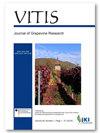The effect of leaf area and crop level on the concentration of amino acids and total nitrogen in 'Thompson Seedless' grapes
IF 0.7
4区 农林科学
Q3 HORTICULTURE
引用次数: 35
Abstract
20 to 50% of the leaves and 25 to 75% of the clusters on 'Thompson Seedless' vines were removed 12 to 16 days after anthesis. In addition, 25 and 50% of the leaves on other vines were removed 35 and 58 days after anthesis, with no cluster thinning. Total soluble solids in fruits from vines with less than 5 cm 2 of leaf surface per gram of fruits was markedly reduced, while concentration in fruits from vines with a ratio above 10 was considerably higher, compared to the concentration in fruits from vines with ratios intermediate between these two values. The concentrations of arginine, proline, total free amino acids, and total N in berry juice were greatly increased by reducing the crop load. Also, the concentration of each of these substances increased during fruit ripening. A significant correlation between leaf area per vine and level of arginine in the juice was obtained. The concentration of proline in the juice was highly correlated with fruit maturity (°B) and with leaf area per unit weight of fruits. Total nitrogen was also correlated with leaf area per unit weight of fruits. Between 4 and 12 cm 2 leaf area per gram of fruits there was a linear increase in the concentration of proline and total nitrogen in berry juice, while above 12 cm 2 there was generally little further increase in the level of these substances. The ratio of arginine to proline decreased with fruit maturity and with smaller crop weights per vine. Total free amino acids accounted for 64 to 75% of the total nitrogen in the juice of grapes during the fruit-ripening period. Defoliation within 16 days after anthesis reduced crop yields, while later defoliations did not significantly reduce yields.叶面积和作物水平对汤普森无籽葡萄氨基酸和总氮浓度的影响
“汤普森无籽”藤上20%至50%的叶子和25%至75%的簇在开花后12至16天被移除。此外,在其他藤上,25%和50%的叶子在开花后35天和58天被去除,没有簇变薄。每克果实叶面小于5 cm 2的葡萄藤果实中可溶性固形物的含量显著降低,而比值大于10的葡萄藤果实中的可溶性固形物含量明显高于比值介于这两个值之间的葡萄藤果实中的可溶性固形物含量。减少作物负荷显著提高了浆果汁中精氨酸、脯氨酸、总游离氨基酸和总氮的含量。此外,这些物质的浓度在果实成熟过程中都有所增加。单株叶面积与果汁中精氨酸含量呈显著相关。果汁中脯氨酸浓度与果实成熟度(°B)和果实单位重量叶面积高度相关。全氮也与果实单位重量叶面积相关。在每克果实叶面积为4 ~ 12平方厘米之间,浆果汁中脯氨酸和总氮的浓度呈线性增加,而在12平方厘米以上,这些物质的含量一般没有进一步增加。精氨酸与脯氨酸的比值随着果实的成熟和单株产量的减少而降低。在果实成熟期,游离氨基酸占葡萄汁总氮的64 ~ 75%。开花后16天内的落叶会降低作物产量,而较晚的落叶则不会显著降低产量。
本文章由计算机程序翻译,如有差异,请以英文原文为准。
求助全文
约1分钟内获得全文
求助全文
来源期刊

Vitis
农林科学-园艺
CiteScore
1.80
自引率
0.00%
发文量
0
审稿时长
>36 weeks
期刊介绍:
VITIS publishes original scientific papers and critical reviews concerning grapevine biology, molecular biology, breeding, plant pathology, oenology and related fields. Research with a focus on pharmacology or post-harvest technology is not suitable for publication in VITIS.
 求助内容:
求助内容: 应助结果提醒方式:
应助结果提醒方式:


